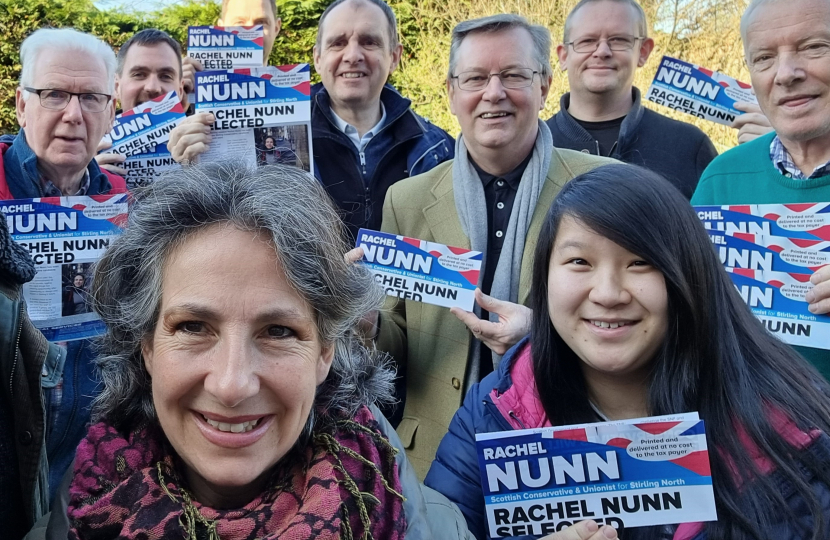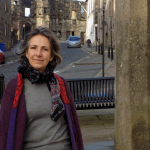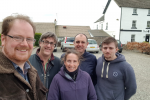
Rachel Nunn, our candidate for Stirling North writes about the need for practical and pragmatic action on climate change.
A graduate of Stirling University and mother of two, Rachel started her career in retail and moved into the third sector focusing on community prosperity and environmental sustainability. Rachel has run her own business, set up an environmental charity, advised national governments on climate change strategy as a campaigner and is getting into politics to help get things done. In her spare time, Rachel is a Cub leader and keen gardener.
The impacts of climate change are increasingly visible. There is a high degree of consensus across the UK both that we need to achieve net zero by the middle of this century, and, more pressingly that we need to make significant progress towards that target by 2030.
Councillors elected in Stirling in 2022 will be in place until 2027, and will make decisions which will determine how far, and what areas, we can make progress. As an administration we will embed a corporate approach across the Council, and ensure that all actions taken by the council identify and take cost effective opportunities to reduce carbon.
A 2020 report published by the Committee on Climate Change highlights that Local Authorities hold the sole powers and responsibility to cut between 30-60% of carbon emissions in their authority area. Currently Stirling has plans to deliver only 2-5% emissions reductions by 2045, concentrating on the Council’s own operations.
Clearly, much more needs to be done, and ultimately, achieving net zero will require action in almost every aspect of life – but at a time when both household and public spending is limited, it is critical that we focus our efforts to get the greatest impacts in the next few years.
Stirling Conservatives believe that the most effective, easiest and best value ways to reduce carbon emissions are those which provide wider benefits – whether reducing, or cutting travel costs through more convenient and reliable public transport or helping ensure drivers across our area have access to the infrastructure needed to charge electric vehicles.
In detail, these are our proposals.
Buildings & Energy
We know energy costs impact on both household and business budgets, and the Russian invasion of Ukraine also highlights the importance of energy security. Insulating buildings, installing solar panels and new heating systems can cut carbon emissions, reduce our household demand for energy and help increase energy generation in the UK as well as saving money.
We recognise that if we are to move to an increasingly electrified system, that we must support large-scale localized energy production that can deliver base-load energy supply. We will commission an energy study to appraise the various technology options and financing arrangements to bring about localized and low carbon energy security.
We will make sure that existing schemes to help households and businesses access energy services are effective and easily accessible in Stirling. If new and additional services are needed to meet this challenge, especially in rural areas, we will put those in place. We promise that every household and business which requests detailed advice will be able to access it over the next five years, and we will work with architects, technicians and the construction sector to ensure that investment translates to economic opportunities for our people.
Transport
Travel is essential for most of us to get to work, education, visit friends and relatives and access services, both within the Council area and further afield. We need to ensure that Stirling residents can continue to receive the benefits of transport, while reducing the negative environmental impacts. We will do this in three ways:
Firstly, we will reduce the need to travel where possible. Lockdowns showed that it was possible for many people to work effectively from home, and there is clear evidence that many businesses recognize the benefits of continuing this to their staff. Fast, reliable broadband and a network of local facilities across Stirling – linked by safe and well-maintained active travel routes wherever possible - are critical to this, and we will put these in place, both directly where necessary and by requiring improvements as part of all new developments.
Secondly, we will improve public transport, by ensuring affordable buses connect people with the places they go regularly, at the times they need to travel, and that bus services integrate with train times to make longer distance travel easier. If new powers are needed to achieve this, we will demand those are given.
We know, though, that car ownership has increased continuously since the 1970s. Electric vehicles offer the chance to continue to access the flexibility of private vehicles, without the direct environmental impacts and at lower operational cost.
At present, the initial cost of EVs means ownership is limited to better off households – but the price of new EVs is already falling and more used vehicles will become available. We need to make sure the charging network is in place to encourage drivers to make the change.
We will do this by introducing financial chargers for EV users at public charging points. This will incentivize private operators to invest, and at the same time, will free up funding which we will use to ensure public charging points are available across Stirling, concentrating on those areas where residents do not have access to off-road parking.
Skills and Economy
We will work alongside local and regional further and higher education partners to ensure closer working with businesses. We will harness their research expertise to help solve business problems and create opportunities for young people, both in practical and graduate jobs.
Land use
We recognise that there are multiple and varied public and nature benefits of changing land use and agriculture to deliver Net Zero. These include flood management, accessible green space, reduction of nitrogen and chemical use, localised food production and the creation of new carbon sinks and the protection of existing ones. We will support Stirling land managers to access Scottish government programmes to prioritise and then achieve these changes.
Communities
Communities have a much more far-reaching role to understand what solutions, transport, buildings, land use will work best for them, than has hitherto been explored. We will systematically reach out, engage and support communities to help us deliver overall aims in ways which best add value to their areas.
Resources
The Scottish government speaks warm words on Net Zero but the current Inquiry into the role of local government and its cross-sectoral partners in financing and delivering a net-zero Scotland highlights that resources to deliver net zero are vastly and knowingly insufficient. Work that the Scottish Conservatives has done shown that access to baseline data is woefully inadequate. As we work on our net zero ambitions we will highlight areas where Scottish Government or UK Government action is needed, and lobby for that action.




